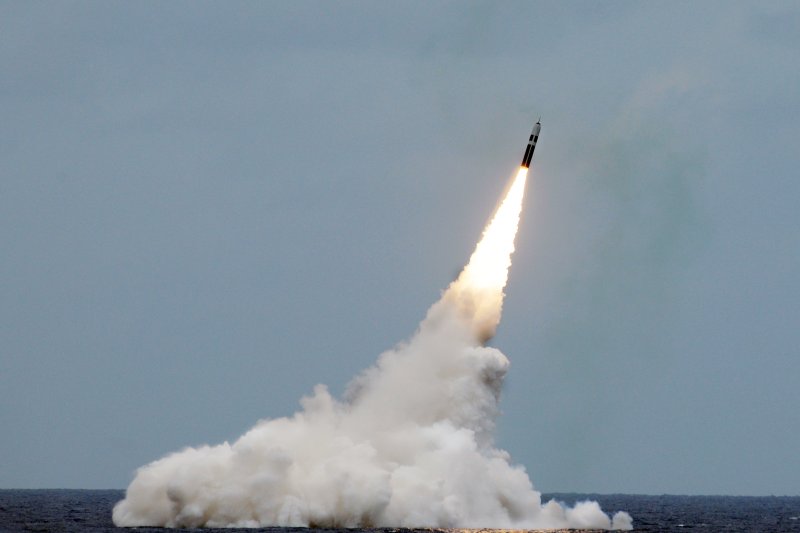An unarmed Trident II D5 missile launches from the Ohio-class fleet ballistic-missile submarine USS Maryland off the coast of Florida in 2016. File Photo by John Kowalski/U.S. Navy
June 4 (UPI) -- Legislation by a Democratic-lead U.S. House committee would block funding for the deployment of a new low-yield nuclear warhead, which has been proposed by the Trump administration amid warnings Russia has restarted its own nuclear tests of that type.
On Monday, Democrats on the Armed Services Committee released their version of the annual defense policy bill. The Armed Services Subcommittee on Strategic Forces, which is run by Rep. Jim Cooper, D-Tenn., will meet Tuesday afternoon for "markup" of its section of the 2020 National Defense Authorization Act.
The low-yield warhead, a modified Trident II D5 ballistic missile, or W76-2, was scheduled to be shipped to the Navy this fall. The National Nuclear Security Administration is expected to finish production this year but funding is needed to deploy them.
Last year, when the Republicans controlled the House, a party-line vote restricted funding for the W76-2's development to $65 million in 2019.
The House Armed Services Committee is now run by Rep. Adam Smith, D-Wash., a critic of the arsenal's size and cost. Smith, who has served on the committee since 1997, reportedly wants even more still more restrictive language.
"I would like to kill the low-yield nuclear weapon, I don't think it's a good idea, and we're going to try to do that," Smith said in March at the Carnegie International Nuclear Policy Conference in Washington, D.C.
But Republicans control the Senate, and President Donald Trump ultimately has to sign the defense bill or veto it.
The top Republican on the committee, Rep. Mac Thornberry, R-Texas, and Strategic Forces Subcommittee ranking member Rep. Mike Turner, R-Ohio, oppose the new language in the bill.
"This is a partisan and irresponsible subcommittee mark that makes us less safe, hinders our ability to defend ourselves, weakens our ability to deter our adversaries, and therefore enables them to challenge us," the lawmakers wrote. And it was a "departure from the bipartisan tradition of the committee pushing those more contentious issues to the full committee."
Besides taking aim on the low-yield nukes, the bill would prevent any withdrawal from the Open Skies Treaty in which nations fly over each other's territory to verify military movements and conduct arms control measures, unless Russia is in breach.
Republicans had limited funding for the treaty flights but the Trump administration has defended the funds to upgrade U.S. sensors and aircraft.
The Trump administration is withdrawing from a separate arms control treaty with Russia, known as the Intermediate-range Nuclear Forces Treaty.
In addition, any development of the Conventional Prompt Global Strike Weapon, or CPGS, would be banned under the Democrats' bill.
The shared system would prevent the chance that U.S. adversaries would misinterpret the launch of a missile with conventional warheads and determine that the missiles carry nuclear weapons. These weapons can strike targets anywhere on Earth in as little as an hour.
In April 2018, the Air Force awarded a $928 million contract to Lockheed Martin to design, develop and test the Hypersonic Conventional Strike Weapon by 2022, and Lockheed has been charged with developing hypersonic glide weapons for all branches of the U.S. military by 2025.
Four other sub-committees are marking up the bill Tuesday, as well: tactical air and land forces, intelligence and emerging threats and capabilities, military personnel and seapower and projection forces.















